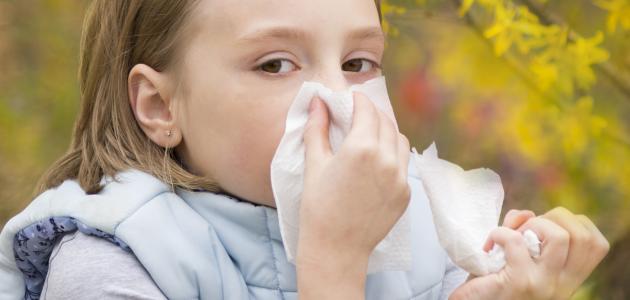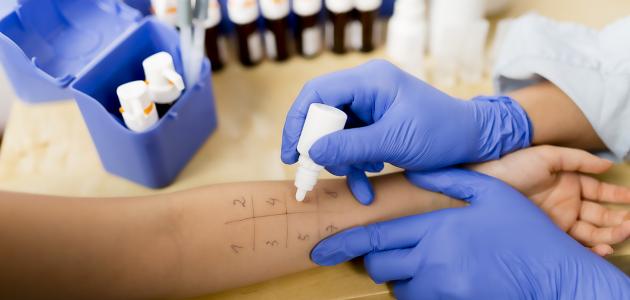Contents
Diagnosis of allergic disease
The diagnosis of allergic disease or allergic through physical examination or conducting some tests and examinations, and in most cases diagnosed doctor allergy based on the examination physically and note the symptoms phenomenon he, in addition to the importance of knowing the medical history of the patient and his family, has resorted to Some cases require an allergy test to confirm the occurrence of an allergy; Either through an allergy skin test or a blood test, and we will cover that in detail in this article. [1]
Health history
Firstly, the doctor is concerned with asking questions to the concerned person to inquire about the symptoms appearing on him and his family history related to allergy. The doctor asks the following: [2]
- What kind of symptoms appear on the patient, when do they appear, and for how long?
- Do the symptoms have any effect on their sense of taste or smell?
- Do your symptoms appear during certain seasons of the year, or do they last throughout the year?
- Do the symptoms appear while staying somewhere, outside or inside the home, or when cleaning the house, for example?
- Do your symptoms improve while on leave and return when you return to work?
- Do symptoms appear when around pets? Does the patient own any kind of pets?
- Is the patient or anyone in his family or around him a smoker?
- What is the heating system used in the patient’s places, and is the central air conditioning system used around him?
- Do allergy symptoms affect the patient's daily activities or sleep at night?
- When do symptoms improve? What medications did he use to relieve symptoms, and how did they work?
- Does the patient have any other health problems; As a crisis (asthma) or high blood pressure?
- What other drugs the patient is taking, regardless of type; Vitamins, nutritional and herbal supplements, and prescription or over-the-counter medications?
The doctor may ask the concerned person to write down the symptoms, possible allergens, and the foods consumed, to refrain from the food that is expected to cause an allergy and to assess the patient's condition there. [3]
Physical examination
In the event that an allergic disease is expected, the doctor begins by conducting a thorough physical examination of the skin, ears, eyes, nose, throat, and chest, and he may resort to examining lung function to determine the efficiency of the lungs in exhaling air, and in some cases he may need a picture of the sinuses or lungs Using x-rays. [4]
Medical examinations to determine the allergen
Determining the allergen is very important to develop an appropriate treatment plan to get rid of allergy symptoms or at least reduce them, and although knowing the allergen may seem like a guessing game, the reality is that choosing the appropriate allergy test to find out the cause is not an easy nor random process. For trained specialists who determine the best test that helps doctors to determine the cause, and it is indicated that knowing the cause directs the patient to refrain from exposure to this cause only without other materials, and therefore his knowledge is very important, and as for the factors on which the selection of the sensitivity test depends on it is many, Including: the symptoms appearing on the patient, the environment surrounding the patient, his hobbies, and his age, then the specialist conducts the appropriate sensitivity test and evaluates and interprets its results, taking into account the patient's medical history, [5] [6]In the context of the conversation, we mention that conducting an allergy test alone is not sufficient to diagnose an allergic disease, but rather it is an integrative process and the results of the test are one of the many tools that the doctor uses when diagnosing the disease. [4]
Skin examination
Before performing an allergy skin test, the doctor asks the patient to stop taking some medications that may affect the effectiveness of the test. Such as antihistamines and monoamine oxidase inhibitors such as selegiline and some antidepressants known as tricyclic antidepressants such as amitriptyline, because these drugs were taken in conjunction with the test It reduces the reaction of the body to the possible allergen, and some doctors may avoid performing a skin allergy test for patients who take beta -blockers because they are at risk of serious health consequences if they develop an allergic reaction as a result of the test, and the drugs that blockers Beta interacts with a number of medications used to treat severe allergies. [7] The following is an outline of the different types of skin tests:
- The skin prick test: also known as the skin prick test, it is a test that is done by pricking the skin with a substance in the forearm of the hand for adults and on the upper back of the children, and this examination reveals sensitivity to 50 different substances at once After 15 minutes of pricking the skin, the patient will notice symptoms of an allergy, and in the event that the allergen is one of the substances tested, a red, prominent bump accompanied by itching that resembles a pinch or mosquito bite will appear on the patient’s skin, and the size of the bump is measured and the results recorded. [8]
- Injection dermal: or intradermal test , doctors resort to this type of skin tests if the test results of the skin prick is not completely clear, are injected material causing allergy by a thin needle under the skin layers external Note any symptoms of allergy, and This examination is likely to reveal an allergic reaction to the allergen. [7] [6]
- Test spot: is used in this test stickers bearing material causing allergy, and placed on the skin without the need to resort to needles, and keep these lenses on hand or the patient 's back for 48 hours, then they are removed in a doctor 's clinic notes irritability or occurrence of allergic The site of the patch, and the results are studied by whether a case of dermatitis developsContact dermatitis, these symptoms may be a sign of an allergy, and the patient should be alerted to avoid bathing or activities that may cause sweating. It may affect the results of the examination, and as for the purpose of this test, it is to detect the allergic reaction to a specific substance, and it also detects the delayed allergic reactions that may appear several days after exposure to the allergen, it is indicated that during the procedure of the patch test may Skin is exposed to approximately 20 to 30 extracts of substances, and these can include: drugs, fragrances, elastomers, hair dyes, preservatives, minerals and resins. [9] [4]
Challenge test
The challenge test is considered one of the most accurate tests for diagnosing a food allergy or drug allergy, but at the same time it is more dangerous than other tests, as the patient ingests or inhales a small amount of a potential allergen, in the event that the doctor suspects that the patient has an allergy to a particular food or drug, and the danger is This test has the potential for a severe allergic reaction to the cause, so it should always be performed under the supervision of a specialist and in medical clinics, so that the severe allergic reaction can be treated if it occurs. [5] [10]
Blood test
Conducted a blood test for the diagnosis of allergic disease by measuring antibodies of the type of IgE to cause allergy in the blood, it is measured in either the total level of each antibody IgE in the blood and this is known as screening test total IgE, or the level of antibody IgE produced in response to cause a particular sensitivity and knows With the specific IgE test, and in the event that the overall test result is high, this indicates the presence of the allergic disease, but without identifying the allergen, as for the specific test, it helps to determine the cause of the allergy in the patient, and the test is usually performed in a way called the Radioallergosorbent test. who knows Acronym RAST, or later known way to test the assay absorbance immune enzyme associated with known Balaliza known as Acronym ELISA. [11][12] It should be mentioned that the blood test is not considered one of the preferred accurate tests in detecting allergies due to the high percentage of error in the results. A positive result may appear without the presence of allergic disease in many cases, in addition to the high price of this test compared to skin tests, as well as the need for time More results are shown, but like all other tests, this test cannot determine the severity of the patient's sensitivity. [11] [4]
Based on the above, doctors do not use a blood test to diagnose allergic disease except in certain medical cases, for example, the skin prick test cannot be used for patients who suffer from a severe allergic reaction such as anaphylaxis, as it may expose the patient to a severe risk, so the blood test is a safe option in This condition, and also in the event that the patient has sensitive skin or a serious skin condition, then blood tests are the most appropriate option that specialists resort to to diagnose their allergic disease, and the good thing is that blood tests do not require stopping the intake of antihistamines unlike the skin prick test, so they are useful For patients who are hypersensitive and unable to stop their medication. [13] [6]
Exclusion Diet
First of all, we note that the exclusion diet can only be performed under supervision and medical supervision, and it is intended that if an allergy is expected as a result of eating a specific food; The doctor resorts to following the elimination diet, and the patient is advised to avoid eating this food and stop it for several weeks and to note the state of symptoms and their improvement, and after several weeks the patient is asked to eat the same food again and any allergic reaction is followed up. [10]
How does the allergy occur?
An allergy occurs as a response from the immune systemAs a result of the body’s exposure to substances in the surrounding environment, it is indicated that these substances do not cause allergies in all people, but rather occur in some because their immune systems interact in a strange way with these substances. Where the immune system secretes antibodies to attack these substances, thinking that they are harmful, although they are not. Such as dust, pollen, pets, insects, some foods, grasshoppers, molds, and some medicines, and when the patient is exposed to the substance that he is allergic to, the reaction from the immune system may cause inflammation of the skin, sinuses, bronchi, or digestive system. And, this irritation or inflammation causes symptoms that vary in severity from person to person, as they can range from simple irritation to anaphylaxis, which is a life-threatening medical emergency.[14] [15]
References
- ↑ "Allergy" , www.drugs.com , 24-8-2020, Retrieved 11-10-2020. Edited.
- ↑ Jennifer Robinson (12-12-2018), “Allergy Diagnosis: Questions Your Doctor Will Ask” , www.webmd.com , Retrieved 10-11-2020.
- ↑ "Allergies" , www.stclair.org , 4-8-2020, Retrieved 11-10-2020. Edited.
- ^ A b T w " , Allergy Diagnosis" , /www.aafa.org , 1-10-2015, Retrieved 11-10-2020. Edited.
- ^ A b "Unit ALLERGY the ABOUT TESTING" , /www.aaaai.org , 28-9-2020, Retrieved 11-10-2020. Edited.
- ^ A b v "Diagnosing Allergies" , Acaai.org , Retrieved 11-10-2020. Edited.
- ^ A b Peter J. Delves (1-7-2019), "Overview The Of Allergic Reactions" , Www.msdmanuals.com , Retrieved 11-10-2020. Edited.
- ↑ "Allergy skin tests" , middlesexhealth.org , 4-4-2020, Retrieved 11-10-2020. Edited.
- ↑ "Allergy skin tests" , www.mayoclinic.org , Retrieved 10-11-2020. Edited.
- ^ A b "Allergies" , Www.nhs.uk , 22-11-2018, Retrieved 11-10-2020. Edited.
- ^ A b " , Allergy Overview The " , Www.urmc.rochester.ed , Retrieved 12-10-2020. Edited.
- ↑ "Allergy Blood Test" , medlineplus.gov , 7-30-2020, Retrieved 10-12-2020. Edited.
- ↑ Colin Tidy (23-9-2020), "Allergies" , patient.info , Retrieved 10-12-2020 . Edited.
- ↑ "What is Allergy?" , www.allergy.org.au , 1-5-2019, Retrieved 11-10-2020. Edited.
- ↑ "Allergies" , www.nchmd.org , 8-4-2020, Retrieved 11-10-2020. Edited.













